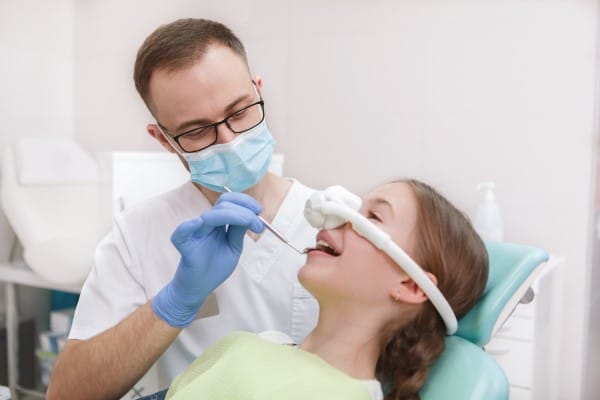What Happens During Dental Sedation?

What is Dental Sedation?
“Dental sedation” covers multiple levels of sedation, depending on the type of procedure you’re having and how anxious you are. The levels of sedation are minimal sedation, moderate sedation, and deep sedation (which often includes general anesthesia). Not all dentists offer sedation dentistry, so it may be necessary for a patient to request it specifically from their doctor, or to see a specialist.
Minimal Sedation
Under minimal sedation, you will be conscious and aware, but you will relax. Minimal sedation will not “put you to sleep,” but it will take away much or all of your anxiety. Minimal sedation most commonly refers to the inhaling of nitrous oxide, also known as laughing gas. After minimal sedation with nitrous oxide, you will recover quickly and be able to drive yourself home.
Another form of minimal dental sedation is administered through oral sedation. Frequently this is through the ingestion of “Halcion,” a Valium-like pill that will make you tired and help you relax. After the procedure, you will need someone else to drive you home.
Moderate Sedation
Under moderate sedation, you will feel sleepy and you will relax. You may have limited memories of the procedure and you may not be able to speak properly for some time. You may also slur your words when you speak.
Moderate sedation can be achieved through larger doses of an oral sedative, such as the above-mentioned Halcion. An IV can also work with moderate sedation, which will speed up the effects. After any moderate sedation, you will need a ride home.
Deep Sedation
Under deep sedation, you will fall asleep. It is unlikely that you will have much of a memory of the procedure that you went under. You can wake up if someone attempts to awake you, but it will be difficult.
Deep sedation often results from a combination of medications or through general anesthesia. It is often a recommendation for more significant oral work, such as the extraction of wisdom teeth or the placement of implants. A deep sedation will take some time to wake up from and will require that you have a friend or family member take you home.
For any type of sedation dentistry, a local anesthetic will usually be necessary. Patients will have some time for both local anesthetic and sedation to take effect. From there, they will complete the dental and the patient will slowly recuperate and wake up with the medications.
Dental sedation is appropriate for those who have dental-related anxiety or those who have sensitive teeth or a low pain threshold. Through sedation, patients can “go to sleep” before the procedure and wake up with it already completed.
So…
For more information about dental sedation or to schedule an appointment with Dennis Baik, DDS, request an appointment in our San Jose dental office here: https://ddsbaik.com. Or call us at (408) 226-5560.
[recent-blogs count=4 layout=”horizontal” category=”sedation-dentist-cat,dental-anxiety-cat,dental-practice-cat,dental-office-cat,dental-center-cat,find-a-dentist-cat”]


